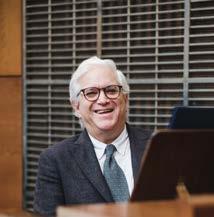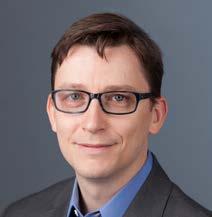
7 minute read
Michael Beckerman
from Smetana200
Michael Beckerman is Carroll and Milton Petrie Chair and Collegiate Professor of Music at New York University. He has written many studies and several books on Czech music topics, including New Worlds of Dvořák (W.W. Norton, 2003), Dvořák and His World (Princeton University Press, 1993), Janáček and His World (Princeton, 2004), Janáček as Theorist (Pendragon Press, 1994), and Martinů’s Mysterious Accident (Pendragon, 2007), as well as Classical Music: Contemporary Perspectives and Challenges (Open Book Publishers, 2021). He has also written articles on such subjects as Mozart, Brahms, film scoring, music of the Roma (Gypsies), exiled composers, and music in the camps. He has been a frequent contributor to The New York Times and was a regular guest on Live from Lincoln Center and other radio and television programs in the United States, Europe, and Japan and lectures throughout Europe and North America. He is a recipient of the Dvořák Medal and the Janáček Medal from the Czech Ministry of Culture, and is also a Laureate of the Czech Music Council; he has twice received the Deems Taylor Award. He served as a Distinguished Professor at Lancaster University (2011–2015) and was The Leonard Bernstein Scholarin-Residence at the New York Philharmonic (2016-17). In 2014, Dr. Beckerman received an honorary doctorate from Palacký University in the Czech Republic. In 2021, he was awarded the Gratias Agit Award from the Czech Ministry of Foreign Affairs and the Harrison Medal from the Society of Musicology in Ireland, and in 2022 he received an honorary doctorate from Masaryk University in the Czech Republic.

Advertisement
Sandra Bergmannová
Sandra Bergmannová was born in Prague, studied Institute of Musicology – Faculty of Arts, Charles University in Prague, both –master’s (graduated in 1999) and doctor’s degree (graduated in 2010) on themes of the early symphonic works of Bohuslav Martinů and the problematic pertaining to their critical edition. During her studies she went for study stay at the University of Durham in England. In 1997-2017 she worked as a musicologist at the Bohuslav Martinů Institute in Prague, where she stood at the beginning of the crucial projects, such as: digitisation of Bohuslav Martinů’s works, Martinů database online; the English-language Bohuslav Martinů Newsletter (2000-2004 Editor-in-chief), exhibition Bohuslav Martinů’s Stage Works Through The Eyes Of Today’s Artists at the national Theatre in Prague, and the most important project of the Institute –Bohuslav Martinů Complete Critical Edition: 2008-2014 – Member of the Editorial Board, Co-ordinator and editor and scientific redactor (2012-2013 Editor in Chief). Since 2017 Sandra works as the Head of the Bedřich Smetana Museum – National Museum in Prague. She is one of the main authors of the exhibition Famous Czech Composers (2020-2022) and the books of the same name in Czech and English. In the research on the life and work of Bedřich Smetana she specializes on creating of the online catalogue of works and is head of the project of the critical edition of the 3rd volume of Smetana’s correspondence (1875-1879). She works also as a piano teacher and is the mother of three children.

Aleš Březina Christopher

Campo-Bowen
Aleš Březina studied violin at the Pilsen Conservatory and musicology at universities in Prague and Basel. Since 1994 he has been the Director of the Bohuslav Martinu Institute in Prague. He has published in Czech and foreign magazines and miscellanies a number of specialist studies about 20th century music, primarily concerning the life and work of B. Martinů. In 1998 he reconstructed the first version of B. Martinů’s opera The Greek Passion (the revision of the score and piano extract was published by Vienna’s Universal Edition), which was premiered at the 1999 Bregenzer Festspiele in Austria in a co-production with the Royal Opera House Covent Garden.
Březina is Chairman of the Editorial Board of the Collected Critical Edition of Works by B. Martinu, he has prepared a host of compositions by this author for revised or urtext publications at Czech, German, English, Austrian and French publishing houses. Especially worthy of mention is the urtext edition of the opera Juliette, or The Key to Dreams, which also served for the preparation of this work at Paris’s Opera Bastille in February 2006.
Březina has given lectures at conferences in many European countries (Prague, Bregenz, London, Paris, Brussels, etc.) and in the USA. He has organised several international musicological conferences and prepared the presented texts for publication. He is also the co-author of and guide to two documentary films directed by Jiri Nekvasil: Bohuslav Martinů: Return from Exile (Czech Television 1998) and Martinu and America (Czech Television 2000).
In 2016 the Association of German Music Publishers awarded Březina the prize Best Edition award for critical edition of The Epic of Gilgamesh by Bohuslav Martinů. In 2020 the chairwoman of The Czech Science Foundation (GAČR) awarded Březina’s project of Bohuslav Martinů Complete Edition as “one of the five best scientific projects of the year.”
Christopher Campo-Bowen is an assistant professor of musicology in the School of Performing Arts at Virginia Tech. He completed his PhD in musicology at the University of North Carolina at Chapel Hill. He holds a BA in Music from Stanford University and an MM in Orchestral Conducting from The Catholic University of America in Washington D.C.
Campo-Bowen’s research focuses on music in the Habsburg Monarchy in the nineteenth and twentieth centuries, especially on the relationships between music, ethnicity, gender, and empire. He is particularly interested how conceptions of ruralness in Czech operas structured notions of subjectivity and identity. His current book project investigates how urbanites’ operatic visions of Czech rural cultures were instrumental in creating a coherent sense of ethnonational belonging, including works by Bedřich Smetana, Antonín Dvořák, and Leoš Janáček. He has published articles in the journals Nineteenth-Century Music, Cambridge Opera Journal, and The Musical Quarterly and presented at various national and international conferences, including the annual conference of the American Musicological Society, the Association for Slavic, East European, and Eurasian Studies annual conference, and the biannual Transnational Opera Studies Conference.
Campo-Bowen received a Fulbright grant for the Czech Republic to perform dissertation research and held a Howard Mayer Brown Fellowship from the American Musicological Society. He was a member of the UNC Royster Society of Fellows as well as the recipient of a Council for European Studies Mellon Dissertation Completion Grant. Prior to coming to Virginia Tech, he was a Provost’s Postdoctoral Fellow in the Department of Music of the Faculty of Arts and Science at New York University. He has trained variously as a violist, singer, and conductor, and he still dabbles in these roles to this day. He is an avid rock climber and also enjoying hiking, camping, and being outdoors generally.

Thomas Jaermann


Studied musicology, popular culture studies and art history at the University of Zurich. In 2016, he completed his doctoral studies focussing on musical ‘Swissness’ as an element of identity politics. Previously, he qualified as a school teacher and acted as head teacher at various schools in Switzerland. From 2011 to 2013, Thomas was a research assistant at the Thurgau University of Teacher Education, Switzerland. Between 2015 and 2016, he was project manager for the Gion Antoni Derungs Foundation (Switzerland), where he was responsible for the compilation of a complete catalogue of compositions by the Swiss composer Gion Antoni Derungs and was awarded the inaugural Institute Recognition Prize (2017) for his research. In 2016, he led a research project for an inventory of compositions commissioned by the Swiss Radio Corporation for the Zurich University of the Arts. In 2017, Thomas edited and published Opus 1 Sieben Winterlieder by the Swiss composer Hans Schaeuble. In 2017, Thomas moved to London where he is currently a Music and German Teacher at a private independent school in London. Besides teaching and freelance research, Thomas’ other interests include music composition with a focus on music for films.
Axel Körner
Axel Körner is Professor of Modern Cultural and Intellectual History at Leipzig University and Honorary Professor at University College London. He held visiting positions at the Institute of Advanced Study, Princeton, at the École Normale Supérieure in Paris and at New York University. In addition to modern Italian, European and Habsburg history, he published widely on the history of opera and music in transnational perspective. His books include America in Italy. The United States in the Political Thought and Imagination of the Risorgimento, 1763-1865 (Princeton, 2017), which won the Helen & Howard Marraro Prize of the American Historical Association. In 2022 he published (together with Paulo Kühl) an edited collection for Cambridge University Press entitled Italian Opera in Global and Transnational Perspective. He currently holds an advanced investigator grant of the European Research Council to work on “Opera and the Politics of Empire in Habsburg Europe, 1815-1914”.
Brian Locke, a native of Toronto, Ontario, Canada, earned an Honours B.Mus. at Wilfrid Laurier University in 1995 and an M.A. in Musicology at the University of Western Ontario in 1997. He pursued doctoral studies in Musicology at the State University of New York, Stony Brook, with Dr. Joseph Auner and Dr. Jane Sugarman, graduating with the Ph.D. in 2002. Prior to his arrival at WIU in 2006, Dr. Locke taught at Dalhousie University (Halifax, Nova Scotia). He attained the rank of Professor of Musicology in 2016. Dr. Locke‘s research interests span a wide range of topics in the Romantic and Early Modernist eras, most specifically in the time period between the death of Richard Wagner and the end of the Second World War. With notable exceptions, his research has focused on the musical community of Prague (Czech Republic) as a nexus of competing ideologies of nationalism and cosmopolitanism; modernism, anti-modernism, and popular culture; and the social responsibility and political discourses of art. His book, entitled Opera and Ideology in Prague: Polemics and Practice at the National Theater, 1900-1938, appeared 2006 with the University of Rochester Press.
Dr. Locke has published several articles in major journals and books of collected essays. These include “The Wozzeck Affair: Modernism and the Crisis of Audience in Prague” (Journal of Musicological Research), “Novák‘s Lucerna and the Historiographical Problem of ‘Czech Modernism‘” (Intersections: Journal of Canadian Music), and „‘The Periphery is Singing Hit Songs‘: The Globalization of American Jazz and the Interwar Czech Avantgarde” (American Music Research Center Journal, 2002). 2014 saw the completion of a nine-year editing project of the full score of Otakar Zich‘s quasi-tonal opera, Vina (Guilt, 1922), published by A-R Edition in full score with complete translation. Forthcoming book chapters include historical and analytical studies of Erwin Schulhoff‘s 1932 opera Flammen/Plameny and the Czech swing community during the Nazi-era Protectorate
Martin Nedbal is Associate Professor of Musicology at the University of Kansas. He is the author of Morality and Viennese Opera in the Age of Mozart and Beethoven (Routledge, 2017) and editor and translator of The Published Theoretical Works of Leoš Janáček (Editio Janáček, 2020). His book Mozart’s Operas and National Politics: Canon Formation in Prague from 1791 to the Present will be published by Cambridge University Press in 2023. Nedbal’s publications include articles on Smetana’s The Bartered Bride (Journal of Musicological Research and Journal of Austrian-American History) and The Brandenburgers in Bohemia (Music and Politics).




